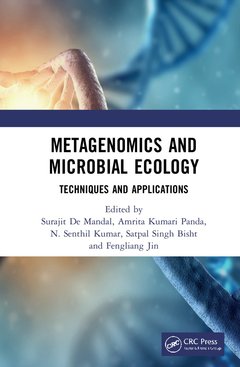Description
Metagenomics and Microbial Ecology
Techniques and Applications
Language: English
Subjects for Metagenomics and Microbial Ecology:
Keywords
Gut Microbiome; Microbial Communities; Gut Microbiota; PICRUSt; Plant Microbiome; 16S rRNA Gene; Metagenomic DNA; Methane Metabolism; Earthworm Gut; Viral Metagenomics; Honey Bee; Glycolithocholic Acid; Environmental DNA; Amplicon Sequencing; Stacked Bar Plots; Rhizospheric Microbiome; 16S rRNA Amplicon Sequencing; 16S rRNA; Earthworm Species; Desert Ecosystem; Eisenia Fetida; Bee Bread; Random Forest Machine Learning; Gut Bacterial Community; Taurolithocholic Acid
· 17.8x25.4 cm · Hardback
Description
/li>Contents
/li>Readership
/li>Biography
/li>
Microorganisms comprise the greatest genetic diversity in the natural ecosystem, and characterization of these microbes is an essential step towards discovering novel products or understanding complex biological mechanisms. The advancement of metagenomics coupled with the introduction of high-throughput, cost-effective NGS technology has expanded the possibilities of microbial research in various biological systems. In addition to traditional culture and biochemical characteristics, omics approaches (metagenomics, metaproteomics, and metatranscriptomics) are useful for analyzing complete microbial communities and their functional attributes in various environments.
Metagenomics and Microbial Ecology: Techniques and Applications explores the most recent advances in metagenomics research in the landscape of next-generation sequencing technologies. This book also describes how advances in sequencing technologies are used to study invisible microbes as well as the relationships between microorganisms in their respective environments.
Features:
- Covers a wide range of concepts, investigations, and technological advancement in metagenomics at the global level.
- Highlights the novel and recent approaches to analyze microbial diversity and its functional attributes.
- Features a range of chapters that present an introduction to the field and functional insight into various ecosystems.
Section-I: An Overview of Metagenomics
Principles and analysis of Metagenomics data
Section-II: Metagenomics tools to access microbial diversity
Metagenomics tools for taxonomic annotation
Section-III: Metagenomics of extreme environments
Metagenomic insights into Microbial communities of desert ecosystems
Metagenomic approaches in elucadation of halophiles in coastal area
Metagenome assembly for functional diversity associated with Xenobiotic degradation
Section-IV: Metagenomics of various ecotypes
Earthworm gut microbiome: The uncharted microbiome
Metagenomics of pollen borne microbes and gut microbiota of honey bee
Viral metagenomics
Fresh water Metagenomics: Overall scenario
Section-V: Applications
Microbiomes and Microbial Ecology in Rice Ecosystems
Understanding the Ecosystem Services of Microbes: It’s a small world after all
Commercial exploitation of microbial communal services to enrich plant microbiome
Surajit De Mandal, Ph.D., is a Post-doctoral Researcher at the College of Agriculture, South China Agricultural University, Guangzhou, P. R. China. He has eight years of research experience and published several research articles in international journals. He also acts as acts as an editorial board member/ reviewer for various international journals. His field of interest includes microbial diversity and metagenomics, molecular phylogeny, bioinformatics, and microbial control of insect pests. He is presently working on microbial community analysis using next-generation sequencing methods.
Amrita Kumari Panda, Ph.D is currently working as an Assistant Professor of Biotechnology at Department of Biotechnology, Sant Gahira Guru Vishwavidyalaya Sarguja, Chhattisgarh India. She obtained her Doctoral degree in Biotechnology from Berhampur University, Odisha, India. Dr. Panda received Fast Track Post Doctoral fellowship from Science and Engineering Research Board, Govt. of India, New Delhi. She has more than eight years of research experience in the field of molecular microbiology, microbial diversity and published several articles in national and international peer-reviewed journals. She received Federation of European Microbiological Society (FEMS) Meeting grant award in the year 2014. Her research interest includes Metagenomics and Microbial diversity.
N. Senthil Kumar, Ph.D, is Professor in the Department of Biotechnology, Mizoram University with 16 years of teaching and research experience. His field of interest includes Genomics, Molecular phylogeny and Bioinformatics. He is presently working on metagenomics, cancer DNA markers and mutation analysis. During his post-doctoral stint at Sun Yat-sen University, China he was involved in RNAi studies with chitin synthase gene. He has authored more than 90 research papers, and he is the investigator of various national research projects.
Satpal Singh Bisht, D.Sc is an inspiring Profess




